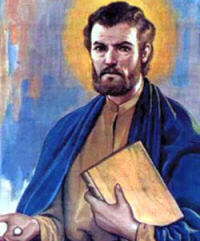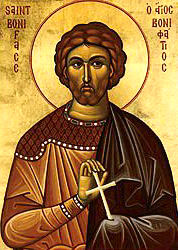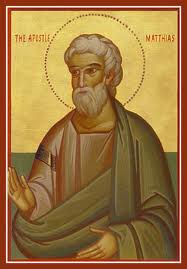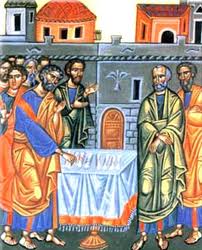9. As the Father has loved me, so have I loved you: continue in my love.
10. If you keep my commandments, you shall abide in my love--even as I have kept my Father's commandments, and abide in his love.
11. These things have I spoken to you, that my joy might remain in you, and that your joy might be full.
AUG. Made bright or glorified; the Greek word may be translated in either way. In Greek it signifies glory; not our own glory, we must remember, as if we had it of ourselves: it is of His grace that we have it; and therefore it is not our own but His glory. For from whom shall we derive our fruitfulness, but from His mercy preventing us.
Wherefore He adds, As My Father has loved Me, even so love I you. This then is the source of our good works. Our good works proceed from faith which works by love: but we could not love unless we were loved first: As My Father has loved Me, even so love I you. This does not prove that our nature is equal to His, as His is to the Father's, but the grace, whereby He is the Mediator between God and man, the man Christ Jesus. The Father loves us, but in Him.
CHRYS. If then I love you, be of good cheer; if it is the Father's glory that you bring forth good fruit, bear no evil. Then to rouse them to exertion, He adds, Continue you in My love; and then shows how this is to be done: If you keep My commandments, you shall abide in My love.
AUG. Who doubts that love precedes the observance of the commandments? For who loves not, has not that whereby to keep the commandments. These words then do not declare whence love arises, but how it is shown, that no one might deceive himself into thinking that he loved our Lord, when he did not keep His commandments. Though the words, Continue you in My love, do not of themselves make it evident which love He means, ours to Him, or His to us, yet the preceding words do: I love you, He says: and then immediately after, Continue you in My love.
Continue you in My love, then, is, continue in My grace; and, If you keep My commandments, you shall abide in My love, is, Your keeping of My commandments will be evidence to you that you abide in My love. It is not that we keep His commandments first, and that then He loves; but that He loves us, and then we keep His commandments. This is that grace, which is revealed to the humble, but hidden from the proud. But what means the next words, Even as I have kept My Father's commandments, and abide in His love: i.e., the Father's love, wherewith He loves the Son.
Must this grace, wherewith the Father loves the Son, be understood to be like the grace wherewith the Son loves us? No; for whereas we are sons not by nature, but by grace, the Only Begotten is Son not by grace, but by nature. We must understand this then to refer to the manhood in the Son, even as the words themselves imply: As My Father has loved Me, even so love I you.
The grace of a Mediator is expressed here; and Christ is Mediator between God and man, not as God, but as man. This then we may say, that since human nature does not pertain to the nature of God, but does by grace pertain to the Person of the Son, grace also pertains to that Person: such grace as has nothing superior, nothing equal to it. For no merits on man's part preceded the assumption of that nature.
ALCUIN. Even as 1 have kept My Father's commandments. The Apostle explains what these commandments were: Christ became obedient to death, even the death of the cross (Phil 2:8).
CHRYS. Then because the Passion was now approaching to interrupt their joy, He adds, These things have I spoken to you, that my joy may remain in you: as if He said, And if sorrow fall upon you, I will take it away, so that you shall rejoice in the end.
AUG. And what is Christ's joy in us, but that He deigns to rejoice on our account? And what is our joy, which He says shall be full, but to have fellowship with Him? He had perfect joy on our account, when He rejoiced in foreknowing, and predestinating us; but that joy was not in us, because then we did not exist: it began to be in us, when He called us. And this joy we rightly call our own, this joy wherewith we shall be blessed; which is begun in the faith of them who are born again, and shall be fulfilled in the reward of them who rise again.
12. This is my commandment, that you love one another, as I have loved you.
13. Greater love has no man than this, that a man lay down his life for his friends.
14. You are my friends, if you do whatsoever I command you.
15. Henceforth I call you not servants; for the servant knows not what his Lord does; but I have called you friends; for all things that I have heard of my Father I have made known to you.
16. You have not chosen me, but I have chosen you, and ordained you, that you should go and bring forth fruit, and that your fruit should remain: that whatsoever you shall ask of the Father in my name, He may give it you.
THEOPHYL. Having said, If you keep My commandments, you shall abide in My love, He shows what commandments they are to keep: This is My commandment, That you love one another.
GREG. But when all our Lord's sacred discourses are full of His commandments, why does He give this special commandment respecting love, if it is not that every commandment teaches love, and all precepts are one? Love and love only is the fulfillment of every thing that is enjoined. As all the boughs of a tree proceed from one root, so all the virtues are produced form one love: nor has the branch, i.e. the good work, any life, except it abide in the root of love.
AUG. Where then love is, what can be wanting? Where it is not, what can profit? But this love is distinguished from men's love to each other as men, by adding, As I have loved you. To what end did Christ love us, but that we should reign with Him? Let us therefore so love one another, as that our love be different from that of other men; who do not love one another, to the end that God may be loved, because they do not really love at all. They who love one another for the sake of having God within them, they truly love one another.
GREG. The highest, the only proof of love, is to love our adversary; as did the Truth Himself, who while He suffered on the cross, showed His love for His persecutors: Father, forgive them, for they know not what they do (Luke 23:34). Of which love the consummation is given in the next words:
Greater love has no man than this, that a man lay down his life for his friends. Our Lord came to die for His enemies, but He says that He is going to lay down His life for His friends, to show us that by loving, we are able to gain over our enemies, so that they who persecute us are by anticipation our friends.
AUG. Having said, This is My commandment: that you love one another, even as I have loved you (1 Jn 3); it follows, as John said in his Epistle, that as Christ laid down His life for us, so we should lay down our lives for the brethren. This the martyrs have done with ardent love And therefore in commemorating them at Christ's table, we do not pray for them, as we do for others, but we rather pray that we may follow their steps. For they have shown the same love for their brother, that has been shown them at the Lord's table.
GREG. But whoever in time of tranquillity will not give up his time to God, how in persecution will he give up his soul? Let the virtue of love then, that it may be victorious in tribulation, be nourished in tranquillity by deeds of mercy.
AUG From one and the same love, we love God and our neighbor, but God for His own sake, our neighbor for God's. So that, there being two precepts of love, on which hang all the Law and the Prophets, to love God, and to love our neighbor, Scripture often unites them into one precept. For if a man love God, it follows s that he does what God commands, and if so, that he loves his neighbor, God having commanded this. Wherefore He proceeds: You are My friends, if you do whatsoever I command you.
GREG. A friend is as it were a keeper of the soul. He who keeps God's commandments, is rightly called His friend.
AUG. Great condescension! Though to keep his Lord's commandments is only what a good servant is obliged to do, yet, if they do so, He calls them His friends. The good servant is both the servant and the friend. But how is this? He tells us: Henceforth I call you not servants, for the servant knows not what his Lord does. Shall we therefore cease to be servants, as soon as ever we are good servants? And is not a good and tried servant sometimes entrusted with his master's secrets, still remaining a servant? We must understand then that there are two kinds of servitude, as there are two kinds of fear. There is a fear which perfect love casts out; which also has in it a servitude, which will be cast out together with the fear. And there is another, a pure fear, which remains forever.
It is the former state of servitude, which our Lord refers to, when He says, Henceforth I call you not servants, for the servant knows not what his Lord does; not the state of that servant to whom it is said, Well done, you good servant, enter you into the joy of your Lord (Matt 25:21), but of him of whom it was said below, The servant abides not in the house for ever, but the Son abides ever. Forasmuch then as God has given us power to become the sons of God, so that in a wonderful way, we are servants, and yet not servants, we know that it is the Lord who does this. This that servant is ignorant of, who knows not what his Lord does, and when he does any good thing, is exalted in his own conceit, as if he himself did it, and not his Lord; and boasts of himself, not of his Lord.
But I have called you friends, for all things that I have heard of My Father, I have made known to you.
THEOPHYL. As if He said, The servant knows not the counsels of his lord; but since I esteem you friends, I have communicated my secrets to you.
AUG. But how did He make known to His disciples all things that He had heard from the Father, when He forebore saying many things, because He knew they as yet could not bear them? He made all things known to His disciples, i.e., He knew that He should make them known to them in that fullness of which the Apostle said, Then we shall know, even as we are known (1 Cor 13:12). For as we look for the death of the flesh, and the salvation of the soul, so should we look for that knowledge of all things, which the Only-Begotten heard from the Father.
GREG. Or all things which He heard from the Father, which He wished to be made known to His servants: the joys of spiritual love, the pleasures of our heavenly country, which He impresses daily on our minds by the inspiration of His love. For while we love the heavenly things we hear, we know them by loving, because love is itself knowledge. He had made all things known to them then, because being withdrawn from earthly desires, they burned with the fire of divine love.
CHRYS. All things, i.e., all things that they ought to hear. I have heard, shows that what He had taught was no strange doctrine, but received from the Father.
GREG. But let no one who has attained to this dignity of being called the friend of God, attribute this superhuman gift to his own merits:
You have not chosen Me, but I have chosen you.
AUG. Ineffable grace! For what were we before Christ had chosen us, but wicked, and lost? We did not believe in Him, so as to be chosen by Him: for had He chosen us believing, He would have chosen us choosing. This passage refutes the vain opinion of those who say that we were chosen before the foundation of the world, because God foreknew that we should be good, not that He Himself would make us good.
For had He chosen us, because He foreknew that we should be good, He would have foreknown also that we should first choose Him, for without choosing Him we cannot be good; unless indeed he can be called good, who has not chosen good. What then has He chosen in them who are not good? you can not say, I am chosen because I believed; for had you believed in Him, you had chosen Him. Nor can you say, Before I believed I did good works, and therefore was chosen. For what good work is there before faith? What is there for us to say then, but that we were wicked, and were chosen, that by the grace of the chosen we might become good?
AUG. They are chosen then before the foundation of the world, according to that predestination by which God foreknew His future acts. They are chosen out of the world by that call whereby God fulfills what He has predestined: whom He did predestine, them He also called (Rom 8:30).
AUG. Observe, He does not choose the good; but those, whom He has chosen, He makes good: And I have ordained you that you should go, and bring forth fruit. This is the fruit which He meant, when He said, Without Me you can do nothing. He Himself is the way in which He has set us to go.
GREG. I have set you, i.e., have planted you by grace, that you should go by will: to will being to go in mind, and bring forth fruit, by works. What kind of fruit they should bring forth He then shows: And that your fruit may remain; for worldly labor hardly produces fruit to last our life; and if it does, death comes at last, and deprives us of it all. But the fruit of our spiritual labors endures even after death; and begins to be seen at the very time that the results of our carnal labor begin to disappear. Let us then produce such fruits as may remain, and of which death, which destroys every thing, will be the commencement.
AUG. Love then is one fruit, now existing in desire only, not yet in fullness. Yet even with this desire whatever we ask in the name of the Only-Begotten Son, the Father gives us: That whatsoever you shall ask the Father in My name, He may give it you. We ask in the Savior's name, whatever we ask, that will be profitable to our salvation.
17. These things I command you, that you love one another.
AUG. Our Lord had said, I have ordained that you should walk and bring forth fruit. Love is this fruit. Wherefore, He proceeds: These things I command you, that you love one another. Hence the Apostle said, The fruit of the Spirit is love(Gal 5:22), and enumerates all other graces as springing from this source. Well then does our Lord commend love, as if it were the only thing commanded: seeing that without it nothing can profit, with it nothing be wanting, whereby a man is made good.
CHRYS. Or thus: I have said that I lay down My life for you, and that I first chose you. I have said this not by way of reproach, but to induce you to love one another.
Then as they were about to suffer persecution and reproach, He bids them not to grieve, but rejoice on that account: If the world hates you, you know that it hated Me before it hated you: as if to say, I know it is a hard trial, but you will endure it for My sake.
Catena Aurea John 15



 The virtues, labor, and sufferings of St. Mathias have not been handed down to us: this explains the lack of proper lessons on his life, such as we have for the feasts of the rest of the apostles. Clement of Alexandria records in his writings several sayings of our holy apostle. One of these is so very appropriate to the spirit of the present season, that we consider it a duty to quote it. 'It behooves us to combat the flesh, and make use of it, without pampering it by unlawful gratifications. As to the soul, we must develop her power by faith and knowledge.' How profound is the teaching contained in these few words! Sin has deranged the order which the Creator had established. It gave the outward man such a tendency to grovel in things which degrade him, that the only means left us for the restoration of the image and likeness of God unto which we were created, is the forcible subjection of the body to the spirit. But the spirit itself, that is, the soul, was also impaired by original sin, and her inclinations were made prone to evil; what is to be her protection? Faith and knowledge. Faith humbles her, and then exalts and rewards her; and the reward is knowledge.
The virtues, labor, and sufferings of St. Mathias have not been handed down to us: this explains the lack of proper lessons on his life, such as we have for the feasts of the rest of the apostles. Clement of Alexandria records in his writings several sayings of our holy apostle. One of these is so very appropriate to the spirit of the present season, that we consider it a duty to quote it. 'It behooves us to combat the flesh, and make use of it, without pampering it by unlawful gratifications. As to the soul, we must develop her power by faith and knowledge.' How profound is the teaching contained in these few words! Sin has deranged the order which the Creator had established. It gave the outward man such a tendency to grovel in things which degrade him, that the only means left us for the restoration of the image and likeness of God unto which we were created, is the forcible subjection of the body to the spirit. But the spirit itself, that is, the soul, was also impaired by original sin, and her inclinations were made prone to evil; what is to be her protection? Faith and knowledge. Faith humbles her, and then exalts and rewards her; and the reward is knowledge.  According to certain very unreliable "Acts", Boniface was a Roman citizen who for a time lived in sinful union with a noble woman named Aglae. Upon his conversion he determined to do penance by seeking the remains of martyrs and giving them honorable burial. At Tarsus he found many confessors about to be martyred for professing the faith; he kissed their chains and encouraged them to bear their sufferings courageously, assuring them that everlasting rest would follow a brief struggle. Finally he himself was taken captive, his body mangled with iron hooks, and boiling lead poured into his mouth. In spite of excruciating pain only one cry came from the lips of Boniface: "I thank You, Christ Jesus, Son of God!"
According to certain very unreliable "Acts", Boniface was a Roman citizen who for a time lived in sinful union with a noble woman named Aglae. Upon his conversion he determined to do penance by seeking the remains of martyrs and giving them honorable burial. At Tarsus he found many confessors about to be martyred for professing the faith; he kissed their chains and encouraged them to bear their sufferings courageously, assuring them that everlasting rest would follow a brief struggle. Finally he himself was taken captive, his body mangled with iron hooks, and boiling lead poured into his mouth. In spite of excruciating pain only one cry came from the lips of Boniface: "I thank You, Christ Jesus, Son of God!" 




